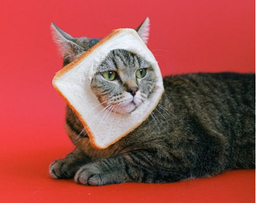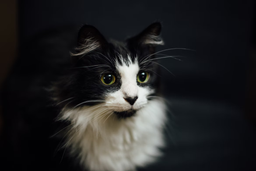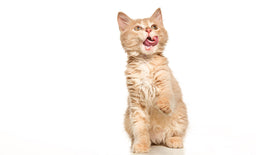Raw food for British Shorthair cats—is it the ideal choice?
British Shorthairs are generally not fussy or sensitive cats.
When it comes to their diet, British Shorthairs‘ needs are the same as any other cat’s, with no particular areas you need to pay special attention to.
Like other cats, though, British Shorthairs can fall prey to digestive, urinary tract, and weight control issues, all of which are directly related to what they eat.
Raw food, while currently trending, demands considerable care and attention to make sure that nothing harmful is ingested and cats stay healthy and happy.
Is raw food for British Shorthair cats a good idea? Read on to get the best advice!

“Fooooooooodddddd noooooooooowwww!!!!”
Source: Pixabay
How does raw food work?
The idea behind raw food is to feed your cat the way nature intended. In the wild, cats hunt and catch:
These are all eaten raw and usually devoured entirely, including bones, organs, viscera, and even stomach contents.
Raw food—similarly to B.A.R.F. nutrition—does exactly what it says on the tin, usually being made up of uncooked:
- Cuts of meat
- Animal or vegetable fat
Cuts of meat
Meat is essential for your cat to get the protein needed for:
- Healthy muscle development
- Organ maintenance
- Skin and coat care
As obligate carnivores, cats can’t get enough of the amino acids (like taurine) that they need from vegetable protein and require ample amounts of meat in their diet to grow and maintain bodily functions.
Most meats are fine, but you can check the quality of the meat you choose by referring to its biological value (BV). The BV measures the percentage of protein that a cat can metabolise, and the following meat and fish have the best BV for felines:
Animal fat
As well as being an excellent secondary source of energy (after protein), fat delivers essential fatty acids such as:
- Arachidonic acid
- Linoleic acid
- Omega-3 and omega-6
These help your feline maintain cell structure and regulate the inflammatory response that allows the body to repair itself.
Fat also tastes great for cats—they have evolved to go wild about the smell and taste of animal fat to ensure they nourish themselves primarily from prey and not grass and plants in the wild.
Most raw food recipes feature meat and fat as their main—and sometimes only—ingredients.
Some downloadable recipes and pre-prepared raw food meals add vegetables or grains and cereals to deliver purported health benefits. Some even claim to offer vegetarian or vegan options for cats, but experts in feline nutrition all agree that this is not a complete and balanced diet for a cat.
Many raw food recipes found online have been tested and certified by vets as being suitable for your cat. As long as you stick rigorously to the formula, your British Shorthair can live off a raw diet.

“Not well, tummy hurts!”
Source: Pixabay
What are the dangers of raw food for British Shorthairs?
While most raw food diets are fine nutritionally, there are several dangers inherent in the preparation of raw food that could have serious consequences for your British Shorthair. The most serious issues revolve around the:
- Choice of meat
- Preparation of each meal
Choice of meat
Raw meat is a breeding ground for all kinds of bacteria, both good and bad.
In pre-prepared cooked cat food, harmful bacteria will usually be destroyed in the cooking process, meaning your cat won’t suffer an invasion of germs.
Raw meat still carries harmful bacteria, such as:
- E. coli
- Salmonella
- Staphylococci
- Listeria
In healthy cats eating cooked food, a balance between bad gut bacteria and good organisms—like Bifidus and lactobacilli—is maintained naturally. This balance can be upset by a sudden influx of germs from raw meat, so a raw diet for your British Shorthair will only be healthy if you buy meat from a guaranteed allergen-free supplier. This can quickly become an expensive exercise.
Preparation of each meal
For similar reasons, preparing raw food for your British Shorthair requires scrupulous hygiene. To keep both your cat and yourself safe from infection, you need to develop a hygiene routine that includes:
- Setting aside a dedicated preparation area for the raw food
- Disinfecting all work surfaces immediately after use
- Using separate equipment from that used for your own food
When you prepare raw food on your own (rather than buying pre-packaged raw meals), you also need to be exact when weighing and measuring ingredients. Guessing or estimating amounts of each ingredient can result in:
- Your British Shorthair not getting enough of a certain nutrient
- The formulation varying from batch to batch, causing potential stomach issues
What can happen if you prepare raw food badly?
Sloppy preparation of raw food can lead to serious issues, even for your normally robust British Shorthair.
The most common result of bad raw food is a gastrointestinal illness, such as:
- Salmonellosis—Salmonella infections can be nasty, causing:
- Diarrhoea
- Nausea and vomiting
- Dehydration
- Reluctance to eat, leading to rapid weight loss
- Listeriosis—Listeriosis presents with similar symptoms to salmonellosis but can also cause lethargy and fever
Either of these diseases can result in death if left untreated, and the first thing your vet will do is to prescribe:
- Antibiotics
- A safe and nutritious recovery diet to restore normal gut function
Raw food requires even more care if you have either a kitten or a senior cat.
Kittens’ immune and digestive systems are only fully developed after about six months, so they are highly susceptible to tummy upsets. Any interruption to their normal eating habits can affect their growth and development adversely.
Senior cats’ bodies begin to slow down, leaving them more susceptible to gastrointestinal disorders and less able to recover easily.

“Is that raw chicken for meeeeee?”
Source: Pixabay
Apart from the danger of food poisoning, feeding raw food to your British Shorthair also runs the risk of not providing all the required:
- Vitamins
- Minerals
Vitamins
Your British Shorthair needs vitamins A, B complex, D, and E as part of the diet. Lean muscle meat, such as chicken breast, may not provide enough of these, and the best sources for each are:
|
Vitamin Type |
Best sources |
|
Vitamin A |
|
|
Vitamin B complex |
|
|
Vitamin D |
|
|
Vitamin E |
|
Your raw food diet should include enough liver to ensure your British Shorthair’s vitamin needs are covered.
Minerals
Any diet for your British Shorthair needs to contain minerals such as:
- Potassium
- Phosphorous
- Magnesium
- Manganese
- Calcium
- Zinc
Creating your own raw food recipes risks not providing the correct balance of minerals for good health, which could lead to:
- Hyperkalaemia, or an excess of potassium
- Hypernatremia, or too much sodium
- Urinary tract infections (UTIs), such as cystitis or bladder stones
Can Untamed help with appropriate food for your British Shorthair?
Untamed wet cat food gives your British Shorthair all the benefits of raw food with none of the drawbacks. By using gentle cooking methods, Untamed ensures our food is wholesome and nutritious but removes the risk of illness that you run when buying or preparing raw food.
Our recipes—like Chocka Chicken, Tuck-in Tuna, or Full-on Fishy—are all based on the same ideas as raw food, being:
- High in exclusively animal protein
- Vet-approved and developed
- Ethically produced to safeguard the planet
High in exclusively animal protein
Each Untamed tin contains up to twice the amount of animal protein than most commercial cat foods. This means your British short hair gets all the calories, macro, and micronutrients needed to stay healthy and happy.
Such high protein content also means your British Shorthair should be able to avoid:
- Shedding and hairballs
- Weight issues by getting healthy energy and not calories from carbs
With products in rich jelly or cat gravy, you can also rest assured that your British Shorthair will love the taste of Untamed even if they’re only used to eating kibbles.
Untamed should be everything your British Shorthair needs and wants.
Vet-approved and developed
Each Untamed formula has been honed to provide the ultimate for your British Shorthair. Untamed cat food contains no known allergens or artificial ingredients and uses human-grade meat to guarantee the best quality for your feline.
The result should be fewer of the health niggles that even resilient British Shorthairs can suffer from.
Ethically produced to safeguard the planet
Untamed believes that we should keep our planet safe for our feline companions. To ensure this, we:
- Only source our meat and fish from sustainable, cruelty-free suppliers
- Make our packaging 100% recyclable
- Use carbon-neutral manufacturing and logistics processes
Fed up with the hassle and risk of raw food for your British Shorthair? Try Untamed and get the best nutrition without the pain!

“That’ll do nicely!”
Image (c) Untamed
How can you get Untamed for your British Shorthair?
Changing over to Untamed for your British couldn’t be easier. Three steps and a regular supply of Untamed—tailor-made to your kitty’s needs and tastes—can be on its way to you in no time—here’s what you need to do:
- Give us some info about your British Shorthair
- Choose a meal plan for your feline
- Order your first trial pack
Once your cat food trial pack arrives, you and your kitty can start exploring the taste sensations of Untamed. You can relax knowing that your feline’s nutrition is in safe hands.
Depending on what diet your kitty has been on up to now, you may notice the following positive changes after choosing our healthy cat food subscription plan:
|
Timeline |
What Untamed can achieve |
|
Within a week |
|
|
In two months |
|
|
After four months |
|
|
For life |
|

![Best food for Ragdoll cats in the UK [Broken Down]](http://untamed.com/cdn/shop/articles/featured_best_food_for_ragdoll_cats_uk.jpg?v=1646818249&width=256)

